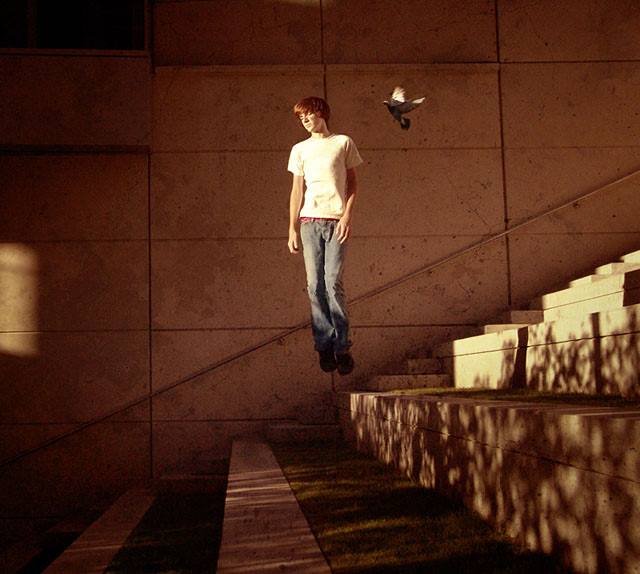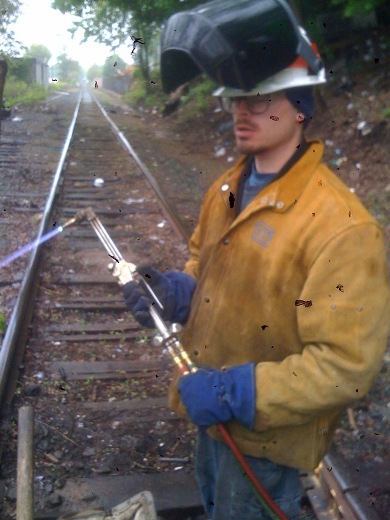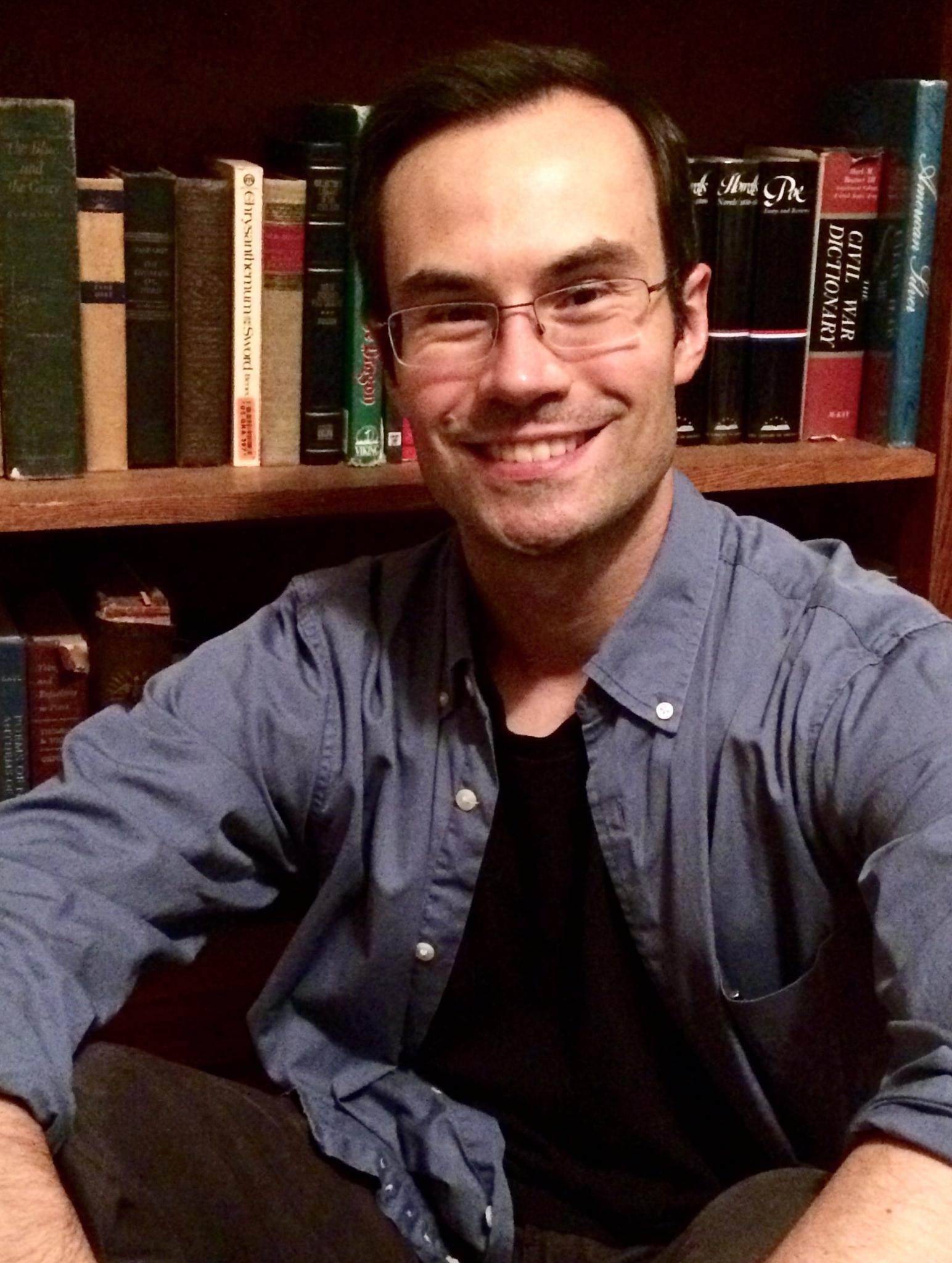
The eleven o’clock news goes to commercial. I look down at the empty juice glass by my foot. A single ruby droplet at the bottom takes on a warm glow from the lamp that burns in the opposite corner of the living room. I pick up the glass, bring it to my lips, and toss my head back like a grizzled cowhand in Bonanza taking a shot of whiskey. Some sandy sediment clings to my front teeth while the tiny droplet trickles down my throat, barely noticeable.
I stand up with a grunt and mosey from the living room, leaving my father sitting in front of the TV. The sound of a Jetta commercial fades to a dull blur as I round the corner. I push through the heavy swinging door that separates the living room from the kitchen.
The empty bottle stands on the counter next to the sink. Fresh droplets of water run down the inside of the green glass in rivulets. My mother has beaten me to it. Saturday is recycling day in my New Jersey hometown. I should have known that my mother, who has just gone to bed, would have swept through the house, confiscating every stray bottle, can, and newspaper.
I sigh with disappointment and relief. Then I cross the kitchen and place my glass in the sink. As I turn away to head for the bathroom, something catches my eye. It’s a bottle of Jim Beam Black, half hidden in the corner behind the Mr. Coffee. An inch of liquor lingers at the bottom of the bottle.
I snatch the bottle from its hiding place and set it on the counter in front of me. There really is only a little bit left. Barely a shot. I rescue my glass from the sink and pour the last of the Beam. What’s another ounce or two of bourbon on top of five ounces of wine? That makes one more bottle for recycling. Call it my good deed for the day.
With juice glass in hand, I sally back into the living room. My father hasn’t moved from the rocking chair. As I make my way to my spot on the couch, I hold the glass down toward my knee. He doesn’t look away from the TV. I drop onto the couch and place the glass on the end table next to me, hidden from view by the base of a lamp.
The news comes back on. Kim Jong Un has traded missiles for tractors. There’s been a shooting in the Bronx. A man ran down a mother and her twin daughters in a crosswalk in Passaic and fled the scene. They close with a happy story. An elderly couple whose son died from addiction donated a Christmas tree to Trenton City Hall in their son’s memory. The smiling newscasters wish us a good night from everyone at Channel 5, then the room falls silent for a moment before another Jetta commercial blares forth.
In that moment of silence, I realize that my father and I are alone.
“So how are things with you?” he asks.
“Pretty good. No complaints.”
“That’s good.”
With one sly hand I take the glass from its strategic location behind the lamp base and down the whiskey in one swallow. I set the glass back down as swiftly as I picked it up, being careful that it doesn’t clatter against the plastic coaster. As before, my father’s eyes don’t leave the TV. We don’t talk about his recent trips to the hospital, my uncertainty about my recent decision to attend graduate school, or about the lovely young woman I’m dating. We’ve never talked about any of that before, and we don’t talk about it now.
Drums rumble, horns blare, and the audience roars as Craig Ferguson takes the stage. A warm sensation envelopes my stomach, like a hug from inside. It skips my chest and rolls up my neck, its fingers massaging my cheeks. My dad and I laugh together at jokes about Sir Paul McCartney’s uncanny resemblance to Queen Elizabeth. I feel good. This is probably the perfect place to stop. Even if the ice between my father and I hasn’t entirely broken, it has at least melted, and I don’t show any of the outward signs of intoxication. I could go to bed tonight and actually rest, wake up in the morning, and not wish I hadn’t.
I no longer follow what’s happening on TV. Instead I laugh when my father laughs and watch Ferguson’s lips, hoping each punchline, the end of each skit will herald the next commercial break.
Ferguson says he’ll be right back. I say the same and make a big show of getting off the couch, as though I’d rather not. I walk quickly—but not too quickly—into the kitchen, where I have to think on my feet. The wine and the whiskey are spent. A brief moment of panic grips me as I wonder if I’ll have to go to bed half lit, having failed at both staying sober and getting drunk. Then I remember.
I flick on the small light over the counter and open the cabinet under the sink. There it stands: my mother’s bottle of Bacardi Gold, untouched since my last visit. She won’t miss a drop or two. I take the bottle out and put it on the counter, making sure my father can hear. Conspicuousness removes suspicion. I fill my glass halfway with rum and replace the bottle under the sink. As I head back toward the living room, I take a healthy sip off the top to give the impression that I had only poured an ounce or two in the first place.
This time, as I reenter the living room my father steals a glance at the glass in my hand without turning his head. His glance stings. My face turns redder than it already was. But my father can’t say a thing about the glass or its contents. He knows it, and I know it. So he doesn’t.
By the time I reach the couch, I’ve forgotten my momentary embarrassment. I set my glass down on the coffee table in front of me, then I start to talk. I talk about music, about how I need a new turntable because I’ve been into the oldies lately and the only way to hear those mono recordings is on vinyl and my turntable is pretty old and I’m afraid it’s going to damage the records.
For a while, my dad nods but says nothing. Then, without looking over, he offers some sage advice on the virtues of belt-drive over direct-drive turntables. After all, when he and my mother were first married, no one was interested in television. Everyone invested in audio equipment. There were entire stores and magazines and catalogs and…
Really? I ask. Tell me more, more, more.
This is fun. I take a sip of rum here, a sip of rum there. I interrupt him to declare that Black Sabbath and the MC5 are the pinnacle of rock and roll and did he know that bands nowadays buy the old Orange amplifiers to try to emulate that sound and isn’t it absurd that artists today release albums on vinyl that were digitally recorded. My brain is on the express track, but I speak with calculated nonchalance, articulating each word so I don’t mess up a good thing with the odd slur.
My dad starts telling a story about a guy he knew in college who was a freak for all kinds of vintage guitar equipment. I’m not listening. Instead, I’m picturing my dad in college, young, mustachioed, full of life. My mother would have been back in their hometown—where we’re sitting right now—waiting for him to graduate so they could marry. My dad hadn’t yet faced the commitment that would prove to be too much pressure for him. Kicking back in a dorm room in the protective isolation of Glassboro, sucking down one Budweiser after another, he was an eighteen-year-old kid who had no idea he was about to ruin his life and that of his future wife, and very nearly the lives of his three unborn sons. What would he have done if he had known? Would he have acted differently?
I’m sure I don’t know, but as I drain the last of the rum from my glass, I do know that I pity this version of my father. Things got away from him. They get away from everyone now and then. Maybe it was the distance in those early days, the one-hundred-and-ten-mile stretch of I-95 that separated him from my mother.
It’s time for a refill.
I stagger to my feet and head for the kitchen, where I take a detour to the bathroom. My parents’ house doesn’t have one on the first floor, so I go down to the basement.
Once down there, I feel my way through the dark toward the tiny bathroom-closet next to the washroom. I tug on the pull chain that dangles from the ceiling and turn to face my reflection in the mirror. In the dim glow of the globe light, my eyes look swollen and half closed. For a fraction of a second, the smoke in my mind clears and a single thought sears through my brain, as sharp and clear as an icicle that catches the sun.
I’m loaded.
For a moment I have the distinct urge to put my fist through the mirror, to smash that image of myself, but I don’t. The lucidity fades as quickly as it came. I do what I came to do, then I wash my hands without looking up. I kill the light and head back across the dark basement toward the stairs. Walking around down here in the dark usually gives me chills, but tonight I take my time, winding my way across the floor, climbing the stairs one at a time without skipping any.
Back in the kitchen, I head to the counter, where the white Formica seems harsher than usual under the pale overhead light. I fish around in the cabinet, shoving the bottle of Bacardi out of the way. If any more of the rum goes missing, my mother will notice, and I’ve never been stupid enough to try to replace Bacardi with Lipton. I start to think I’m off the hook when my hand brushes something cold at the back of the cabinet. I pull it out. It’s an old bottle of cooking sherry, untouched for God knows how long. Joy and disgust wrestle in the pit of my stomach, and for a second I’m afraid I’ll have to make a beeline back to the bathroom. But it passes, and I fill my glass.
A voice inside my head that I recognize as sober Me screams: I don’t want this!
The other Me, who has emerged from his rock and now stands boldly out in the open, replies in his calm and steady voice: Yes, you do.
My head spins. At that moment, it’s a wonder to me that my father can’t hear every word of this argument from the next room.
I grab hold of the counter, and the voices fade. I tell myself that it’s okay, that this is a quarter of what I used to drink on any given Friday in college, that I’m an adult, that I have the right to relax and have a couple of drinks at night, that there’s nothing unusual about it.
The next thing I know, I’m back on the sofa. I don’t feel good anymore. My glass is in front of me, filled almost to the brim with wine that isn’t the color of any wine I’ve seen before. It’s brown, dirty. I start to speak again, even more carefully than before. I am aware, in a vague way, that I’m saying something about what I’d like to do after graduate school, but I focus all of my mental energy on sounding normal. The way I enunciate each vowel probably makes me look like an actor in a silent film, my lips forming each O and E with slow deliberation.
Once again, my father doesn’t appear to notice. Rather than confront me, he seizes the opportunity to reflect on his own career, the career from which he only recently retired but which has been dead in the water for well over a decade. As he drones on about the intricacies of pharmaceutical advertising, I widen my eyes, trying to make them look like normal eyes, to open them all the way and chase away the puffiness I saw in the bathroom mirror. I feel like an owl. Then I do something that I haven’t done all evening, all year, or maybe ever.
I look at my father.
Though he’s stone-cold sober, he looks worse than I do: the bags under his eyes, the ashen skin, the distended belly. There’s nothing he can do about it just now, because his symptoms didn’t appear just now. They are the promise of many years.
I take a sip of dirty wine and watch my father as he talks about big-time marketing campaigns from thirty years ago, about his cutting-edge mentoring strategies. He tells a story about how he once instructed a nervous young employee to write her problem down on an index card and put it into a small wooden box he kept on his desk. By doing so, the employee took her problem and made it his problem. Lo and behold, the girl relaxed, her subconscious went to work, and presto! By the time she arrived at work the next morning, she had solved her problem all on her own, and she thanked my father for his wisdom.
Unlike that doe-eyed employee, my father had a problem that wouldn’t fit in his small wooden box. My parents won’t come out and say why my father has been to the hospital so many times in the last few weeks, but they don’t have to, because I know.
He’s dying.
He’s dying from the inside out, from too many years of refusing to look his problems in the face. He hasn’t had a drink in decades, but the damage is done. His liver gives out a little more each day, and all he can do is sit and reminisce about the time his small wooden box worked for someone else.
My father’s words grow more emphatic as he plunges further down memory lane. He stares at the TV, unseeing, while he gestures with his hands and rattles on about the ruthlessness of corporate life. I realize that I am listening to the words of a man who looks back on his life in the way that someone else might look at an exhibit in a museum: as a foregone conclusion, something dead and preserved with no stake in the future. As I watch his vision of the past play out behind his glassy eyes, it becomes clear that my father is no longer talking to me. He’s forgotten that I’m even in the room, just like he forgot about my mother and two brothers during his days of corporate glory and, later, his nights of debauchery in seedy, bucket-of-blood bars.
This makes me want to scream. His problem is not behind him. It’s eating him alive. It’s eating me alive, too. My father’s problem rushes through my veins faster than the alcohol I’ve consumed tonight. Unlike the alcohol, it does not go away in the morning. It does not stay away during my periods of sobriety, no matter how long they last. It only rushes faster.
I knock back the last of the sherry.
Why won’t he look at me?
Because I’m a young guy who is still exploring his relationship with booze. Because I’ve got dreams and ambitions, I’ve got a nice girlfriend, and I’ve got time to sort it all out. Because I’m a manifestation of the problem he’s worked so hard to lock away in his small wooden box.
Only trouble is, I don’t quite fit.
My father stops talking. The room grows quiet except for the chatter of the TV. We’ve been reduced to watching reruns of American Ninja Warrior. My father looks at his watch.
“Well, I’ve chewed your ear off long enough,” he says. “It’s getting late.”
“What time is it?” I ask.
“Quarter to three.”
“Geez, it is late.”
I get up and walk to the kitchen one last time, feeling unsteady on my feet. It’s time for the usual charade of sneaking up to bed, hoping that each creak of the stairs won’t wake my mother.
After a minute or two spent leaning on the counter, staring into space, I fill my glass with lukewarm tap water and drain it in one gulp. I tell myself that the liquor has been watered down, that I won’t feel it in the morning.
Fat chance, I think as I place my glass in the sink and switch off the overhead light.
Nothing’s free.
D.G. Lasek, originally from New Jersey, now lives with his wife in Massachusetts where he teaches English as a second language. His fiction is forthcoming in Corner Bar Magazine, and his children’s fiction has appeared in Bumples Magazine.




 Jessie Atkin (
Jessie Atkin ( William Cass (
William Cass ( Julianne Clarke (
Julianne Clarke ( Alexander Jones (
Alexander Jones ( Jennifer Schomburg Kanke (
Jennifer Schomburg Kanke ( D.G. Lasek (
D.G. Lasek ( Michael Olenick (
Michael Olenick ( Cole Rise (
Cole Rise ( Richard Risenberg (
Richard Risenberg ( Kate Shakespeare (
Kate Shakespeare ( Kim Shegog (
Kim Shegog ( Andrew Sutherland (
Andrew Sutherland ( Mark Thomas (
Mark Thomas ( John Vanderslice (
John Vanderslice (



